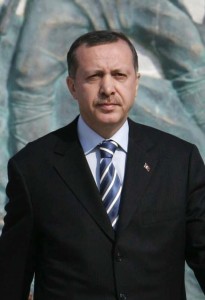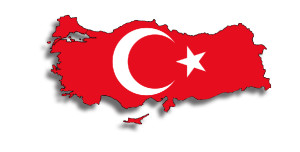The Death of a Vision
For much of its history, Turkey has been a nation of two minds. Following the collapse of the Ottoman Empire in 1922, a new government was formed, thanks almost entirely to the efforts of Mustafa Kemal Ataturk. He envisioned a Westernized Turkey, abolishing Islamic courts, granting equality of the sexes, and establishing new penal and civil codes along European lines. A cult of personality developed around him, and today he means more to Turks than George Washington does to Americans. Despite this adoration, common Turks do not always agree with Ataturk’s ideology, called Kemalism, and the past 60 years have seen several coups performed under the auspices of the military, which sees itself as the guardian of Kemalism.

Since 2002, with the election of Prime Minister Recep Tayyip Erdogan’s Justice and Development (AK) Party, the country has increasingly drifted away from the traditional notion that the army should have a voice in politics. At the same time, it is becoming more concerned with the affairs of Arab nations and associating itself with them. The two go hand in hand; Erdogan cannot position Turkey as a Muslim nation in the Middle East, defying Kemalism, without first undermining the power of the military. Three coups, arguably four if one were to count the successful 1997 request by the military for the prime minister’s resignation, have toppled would-be Islamist governments, and Erdogan can hardly afford to allow the military as much of a say as it has had in the past.
Naturally, Erdogan had to ameliorate the power of the military before he could reveal his designs on the Middle East. In 2003, a year after the party came to power, it introduced an amendment that limited the National Security Council, the military’s highly influential voice, to bi-monthly meetings and allowed for the appointment of non-military personnel. Later that year, the AK government passed legislation increasing parliamentary oversight of military expenditure, over which the military previously had a great deal of control, and in a particularly insulting move adjusted expenditure so that the education budget was greater than that of the military in 2008.
Most recently, hundreds of military personnel, among them admirals and generals, were arrested on the grounds that they were plotting to form an opposition to Erdogan’s government and overthrow it. Allegedly dating to 2003, the so-called Sledgehammer Plot is a total fabrication on the part of the government. Nevertheless, Erdogan and news outlets belonging to the pro-Erdogan Gulden Group support the allegations against the military.
The claims are, for the most part, completely ludicrous. Several defendants were outside of Turkey and without access to a computer when the plans were authored; others misspelled their names and confused their titles, and according to The New Republic, the writing on a particularly damning CD is forged. Further, the plans make reference to companies, hospitals, and ships that did not exist until years after the plan was supposedly hatched. The allegations are a blatant political move to discredit the military, and because they are supported by the prime minister and the major media, they have gained traction with the Turkish people. Some of the accused have been released, but not all, and the PR damage that has been dealt to the military is incalculable.
Erdogan spent the first few years of his time in power weakening the military and has recently begun devoting more time to his Arab neighbors than to the West. This shift in focus was best exemplified in the ruckus over the 2010 Gaza Flotilla raid, in which the Israeli Defense Forces killed nine Turks. Turkey rejected a UN commission decision that agreed with the legality of the blockade and severed diplomatic relations with Israel after the Israeli government refused to issue an apology. Such posturing negatively impacts Turkey’s image in the Western world but raises Turkey’s standing in the primarily anti-Israel Middle East. Erdogan is strengthening ties with Egypt, which calls him “the Islamic leader in the Middle East.” Turkey has also signed a friendship treaty with Saudi Arabia, and after Sudanese President Omar al-Bashir was indicted by the International Criminal Court for Darfurian massacres, Erdogan welcomed him to Turkey, claiming that “Muslims do not commit genocide”.
 Turkey, it seems, is approaching a dramatic shift in its national character. If Erdogan’s government is not an anomaly – and the fact that the army has had to frequently depose previous Islamist regimes suggests that it is not – then the next decade or two may see Turkey abandon traditional Kemalism in an attempt to become the arbiter of Middle Eastern affairs. The army cannot reprise its role as the defender of secularism due to the wide support Erdogan enjoys, and in a few years, it will have been so effectively defanged that it will no longer be able to fulfill its former role. Erdogan’s strategy is an intelligent one, and all that remains to be seen is if he will be successful in achieving his renovatio imperii.
Turkey, it seems, is approaching a dramatic shift in its national character. If Erdogan’s government is not an anomaly – and the fact that the army has had to frequently depose previous Islamist regimes suggests that it is not – then the next decade or two may see Turkey abandon traditional Kemalism in an attempt to become the arbiter of Middle Eastern affairs. The army cannot reprise its role as the defender of secularism due to the wide support Erdogan enjoys, and in a few years, it will have been so effectively defanged that it will no longer be able to fulfill its former role. Erdogan’s strategy is an intelligent one, and all that remains to be seen is if he will be successful in achieving his renovatio imperii.
1 Comment
Join the discussion and tell us your opinion.
This is a fantastic piece. Turkey really does represent a fascinating political climate, and I think it’s really a shame how little the West seems to know about internal Turkish politics, considering how important they are to American and European international policy.